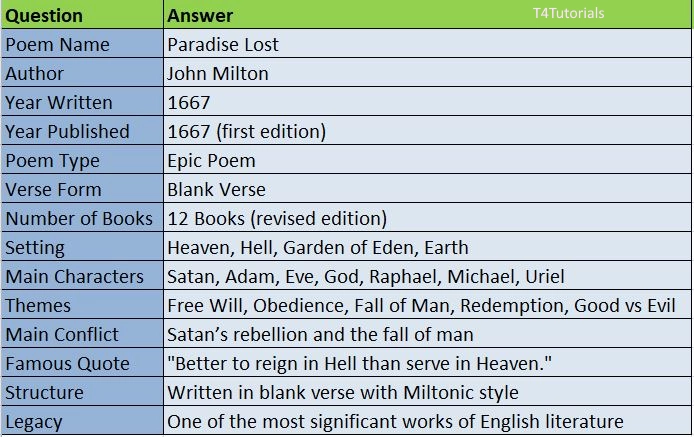Summary:
Paradise Lost is an epic poem by John Milton, first published in 1667 in ten books and later revised into twelve books. The poem narrates the biblical story of the fall of man, focusing on Adam and Eve’s disobedience and their expulsion from the Garden of Eden. The poem begins in Hell, where Satan and his fallen angels regroup after their rebellion against God. Determined to corrupt God’s new creation, Satan escapes from Hell and enters Paradise, where he tempts Eve into eating the forbidden fruit. Adam, out of love for Eve, also eats the fruit, leading to their fall. Despite their transgression, God offers them hope through the promise of redemption. The archangel Michael shows Adam the future of humanity, including the coming of Jesus Christ as the savior. The poem ends with Adam and Eve leaving Paradise, hand in hand, with a renewed sense of faith and repentance. The themes of Paradise Lost include free will, justice, obedience, and the nature of good and evil. The character of Satan, who is portrayed as a tragic yet charismatic figure, has sparked significant debate among scholars, leading to discussions about his role as an anti-hero.
10
Score: 0
Attempted: 0/10
Subscribe
| Question | Answer |
| Poem Name | Paradise Lost |
| Author | John Milton |
| Year Written | 1667 |
| Year Published | 1667 (first edition) |
| Poem Type | Epic Poem |
| Verse Form | Blank Verse |
| Number of Books | 12 Books (revised edition) |
| Setting | Heaven, Hell, Garden of Eden, Earth |
| Main Characters | Satan, Adam, Eve, God, Raphael, Michael, Uriel |
| Themes | Free Will, Obedience, Fall of Man, Redemption, Good vs Evil |
| Main Conflict | Satan’s rebellion and the fall of man |
| Famous Quote | “Better to reign in Hell than serve in Heaven.” |
| Structure | Written in blank verse with Miltonic style |
| Legacy | One of the most significant works of English literature |